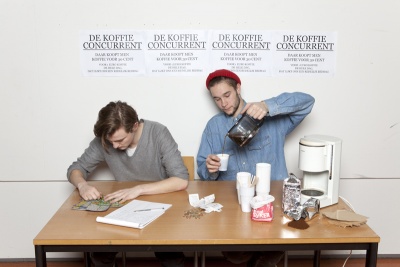User:Roelroscama/creativeIndustries: Difference between revisions
Roelroscama (talk | contribs) |
Roelroscama (talk | contribs) No edit summary |
||
| Line 40: | Line 40: | ||
- is it publically traded exchange market? like the AEX where people can buy and sale bonds? Artist Exchange Index | - is it publically traded exchange market? like the AEX where people can buy and sale bonds? Artist Exchange Index | ||
- is it a private contract infrastructure? an agreement that a graduating class of art students invests jointly in the career of the most promising one. | - is it a private contract infrastructure? an agreement that a graduating class of art students invests jointly in the career of the most promising one. | ||
Revision as of 11:51, 10 June 2013
Background / De Koffieconcurrent
De koffieconcurrent was a shop that sold very affordable cups of coffee in the hallways of the Willem de Kooning Academy. It's business model was as simple as it was mad: To sell cheap coffee and to buy lottery scratchcards with the proceedings at the end of the day. The potential for insane returns and soaring profits was tempting and seemingly within reach for the duration of the month. After a month of running the Koffieconcurrent we made 24 euros with the sales of coffee. After investing these in scratchcards the balance totalled 22 euros.
The project on www.the-force-of-freedom.com
Lottery as a businessmodel
There seem to be interesting parrallels in:
- artists trying to be discovered through calls, paid entries to competitions etc. Willing to work un(der)paid for long itmes in the hope of fame/money/career - people running tech-startups investing massive amounts of time and resources in the hopes of discovering something to attract venture capital or being being bought-up by technology firms. - gamblers willing to continue playing against the odds in the hopes of striking the one lucky time that justifies all.
Eventhough most participants in these 'lotteries' lose, or do not gain in in a big way, they keep participating. Inspired by the few examples of those that became lucky.
Gamblers betting on games/lotteries often rely on pseudo-rationalization to justify why they of all people will win. Relying on lucky numbers, detecting patterns etc. to give them an edge.
The same goes for start-ups and artists. Rationalizing their marginal existence and low odds of success on pseudo-rational reasoning. "If I do this job un(der)paid now.. I have a chance to get a paid one next time". (Then again this is a very economic way of reasoning and as Hans Abbing suggested, artists defy the laws of economics and value other forms of reward over economic gain.)
As stock markets trading is done increasingly by algorithms and is no longer a traditional trader's job, those who sit on copious amount of money no longer invest in stock. Instead they choose to invest in potentially highly rewarding technology startups. A lottery of sorts in itself, where countless fruitless investments are justified by the one that strikes it big.
Old ideas for artist lotteries
communities of artists collectively invest into one promising artist to launch his career so all take a cut of the profits.
-> all for one, one for all - is it publically traded exchange market? like the AEX where people can buy and sale bonds? Artist Exchange Index - is it a private contract infrastructure? an agreement that a graduating class of art students invests jointly in the career of the most promising one.

